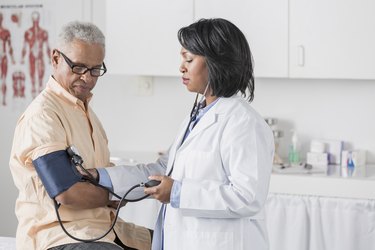
If you're approaching 65, you've likely already started researching all there is to know about Medicare.
But while your insurance plan may change, one thing that won't is the importance of prevention. "There's an old adage, 'an ounce of prevention is worth more than a pound of cure,'" says integrative physician Bindiya Gandhi, MD. "It's easier to change and improve things earlier on."
Video of the Day
Video of the Day
One thing to consider is that your Medicare program can help you continue to prioritize prevention. "Everyone enrolled in Medicare has coverage for many preventive services, such as certain cancer screenings and an annual wellness visit," says Kaitlin Hilton, product director for UnitedHealthcare® Medicare and Retirement. "Taking advantage of those benefits can help catch health problems early, before they become more serious."
Compared to prevention, treating can be more costly, time-consuming and draining (physically and mentally), Dr. Gandhi says.
And speaking of cost, UnitedHealthcare® realizes it's a huge factor when it comes to getting the health care you need. "That's why we continue to focus on providing affordable coverage and offering a portfolio of plan options to meet different needs," Hilton says. "All of our plans offer the high level of service and support people have come to expect from us."
While finding the right insurance plan and focusing on prevention are always essential, there are a few things that start to look a bit different when you turn 65 — including wellness exams.
"There are other screenings that doctors discuss, including your code status and fall prevention," Dr. Gandhi says. "Our job is to keep you healthy and make you aware of things that could potentially be problematic as you age."
Knowing a few questions to ask can make your annual appointment even more helpful. Here are five questions Dr. Gandhi suggests asking to help make sure you're staying on top of your health.
Have I Had all the Necessary Screenings?
Speaking of prevention, Dr. Gandhi recommends asking your doctor about all the screenings you should be getting. These might include: colonoscopy, dual-energy X-ray absorptiometry (DEXA) scan, mammogram and prostate-specific antigen (PSA) test.
Am I at Risk for Heart Disease?
Even if you don't have any risk factors, it's smart to have a conversation about what you can do to minimize your risk when your doctor is checking your blood pressure and cholesterol.
This Is How My Memory Has Been Lately — Is There Anything I Should Be Concerned About?
Memory changes could be caused by something as simple as an underactive thyroid, Dr. Gandhi says, but always bring them up early to rule out or detect any issues.
What Can I Do to Prevent Metabolic Syndrome or Diabetes?
"Having diabetes increases your risk of other medical problems including heart disease and strokes," Dr. Gandhi says. "It also predisposes people to dementia and Alzheimer's." Talk to your doc about what you can do to minimize your risk.
Do I Need Any Immunizations?
Dr. Gandhi says immunizations are especially important as you age. Ask about tetanus, diphtheria, pertussis (TDAP), shingles, flu and pneumonia vaccines to cover your bases.
In short, prevention and annual exams are even more crucial with age. So as you're researching Medicare, make sure to investigate the various kinds of preventive services that may be available to you prior to enrolling in a plan.
Disclaimer:
*Benefits, features and/or devices vary by plan area. Limitations and exclusions apply.
Plans are insured through UnitedHealthcare Insurance Company or one of its affiliated companies. For Medicare Advantage and Prescription Drug Plans: A Medicare Advantage organization with a Medicare contract and a Medicare-approved Part D sponsor. Enrollment in these plans depends on the plan's contract renewal with Medicare.
Copyright/Material ID
©2020 United HealthCare Services, Inc. All rights reserved.
Y0066_200904_092602_M
Is this an emergency? If you are experiencing serious medical symptoms, please see the National Library of Medicine’s list of signs you need emergency medical attention or call 911.